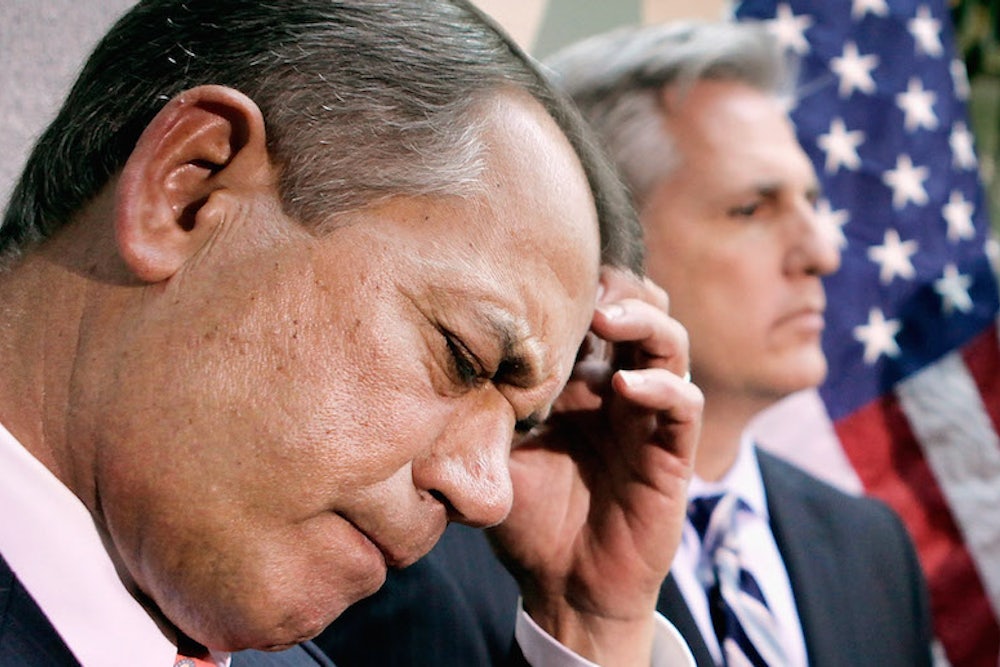After House Speaker John Boehner announced his decision to resign at the end of October, and then more urgently when the Treasury Department alerted Congress that the deadline to increase the statutory debt limit had advanced to the beginning of November, a sense of dread momentarily overwhelmed official Washington.
Budget experts, economists, and anyone with a political memory going back at least four years were abruptly consumed with the likelihood that the responsibility for increasing the debt limit would fall to an untested new speaker—and, more troublingly, a speaker whose election would require him to placate House hardliners with dangerous promises.
The solution to the dilemma was obvious at the time, and remains so: An unencumbered Boehner could place legislation to increase the debt limit on the House floor, and it would pass. But until this week it was unclear how aggressively he intended to clean house before his departure, or whether he'd leave multiple obligations to his successor.
Though the speakership crisis and the debt-limit crisis remain unresolved, the sense of alarm has drained out of the story almost as rapidly as it emerged. Cooler heads have seemingly rescued the debt limit from conservative hostage-takers. And that has created a temptation to celebrate averted catastrophe as a triumph of political reality over right-wing fanaticism.
Succumbing to that temptation would be a huge mistake. It is crucial at this point to take stock of the global dysfunction on the right, and appreciate just how badly it has imperiled our system of government.
We owe the prospect of an uneventful debt limit resolution to a deus ex machina. Boehner’s heir presumptive, Majority Leader Kevin McCarthy, abandoned the race for speaker to the tune of Yakety Sax, denuding the House Benghazi Committee along the way and compelling Boehner to consider increasing the debt limit—either without precondition, or as part of a genuinely bipartisan agreement—before he leaves Congress.
Despite rumblings from the other chamber, this should go down fairly smoothly in the Senate. Senator Majority Leader Mitch McConnell's chief deputy, Sen. John Cornyn of Texas, said in a recent CNN interview that he's "ready to raise the debt limit 'until 2017' in order to get the matter off the table during an election year. McConnell, sources say, feels the same way, and the two sides are discussing the possibility of raising the debt limit until March 2017, just two months after a new president and Congress are sworn in.” Crisis deferred.
Debt-ceiling dramas like this aren’t borne of necessity. They're concocted to appease reactionaries in the House. In this way, they’re an artifact of the Tea Party insurgency five years ago, and the untenable promises GOP leaders made to conservatives after President Obama was first elected. The legislative landscape is littered with such artifacts—past hostage crises, consensus immigration legislation, even the Benghazi committee itself—and it's our good fortune that several of them are now at the forefront of U.S. politics simultaneously.
The fact that Republicans revealed the Benghazi Committee to be an elaborate farce, just in time for Hillary Clinton to testify before it, and that the're likely to extend the Treasury Department’s borrowing authority without incident, can both be construed as side-effects of overreach—a natural political check on extremism that prevents the legislature from becoming completely weaponized. "Whether or not Boehner actually ends up sparing us the needless drama of a protracted confrontation," writes Greg Sargent at The Washington Post, "the fact that he’s looking to resolve this without one itself confirms how this will ultimately end, no matter what has to happen along the way. And there’s no need for anyone to pretend otherwise."
There’s something comforting about that interpretation, and at a general level, it's basically correct. But it doesn’t account for the enormous role coincidence played in saving the country from another near-catastrophe, or outright default, in this particular instance.
It would thus behoove us to be mindful of how badly things could have gone if events had transpired slightly differently—if the debt limit deadline hadn't budged, if McCarthy had succeeded Boehner, by promising confrontation with the White House—before moving on to the next big story. Republican dysfunction has never caused the U.S. to default, but it does create a much higher-risk environment. One plausible remedy lies in the hope that the confluence of events—the speakership crisis, the debt-limit drama, the Benghazi admissions, the Republican primary meltdown—will, in James Fallows’ words, eliminate “the discomfort of reporters, old and young alike, with recognizing that the United States doesn’t currently have two structurally similar political parties approaching issues on roughly comparable terms [but] one historically familiar-looking party, and another converting itself into something else.”
In an interview with Bloomberg View, the political scientist Thomas Mann—who, along with his coauthor Norm Ornstein, has been at pains for years to awaken the press to the reality of modern American politics—explained that “the solution … must focus on the obvious but seldom acknowledged asymmetry between the parties.”
Under quieter circumstances, that would be a pipe dream. Under the extreme circumstances of the moment, it’s a little more plausible. First, though, everyone must resist the temptation to disaggregate these stories and chalk them up individually to dramatic, but ultimately normal, politics.
